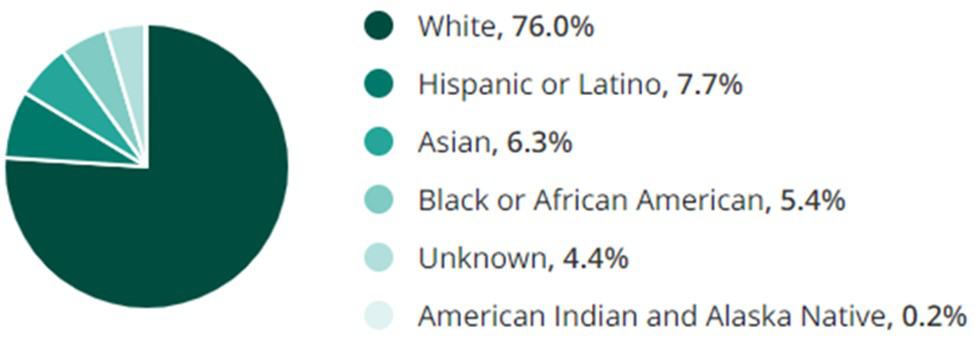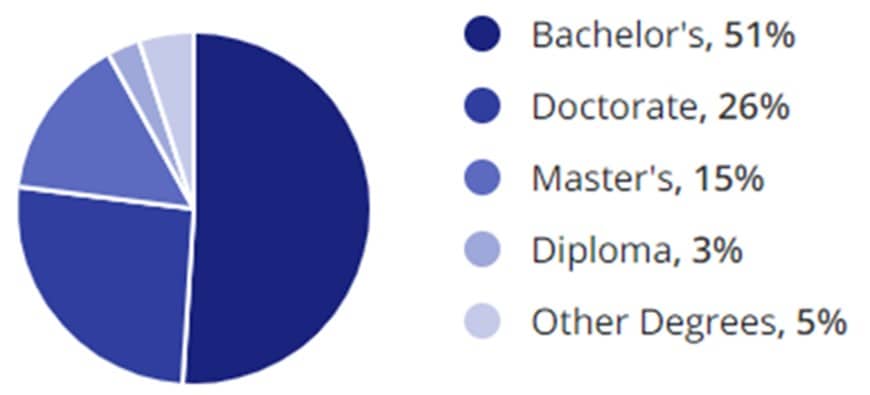Welcome to your comprehensive guide on embarking upon or advancing within the legal profession. In these pages, you will find a roadmap to illuminate the path to achieving your legal career aspirations. This guide offers insights, tools, and resources to help newcomers and current professionals navigate the complexities of the legal jobs market.
The legal profession is more than just a career; it’s a calling to uphold justice, advocate for rights, and contribute to a lawful society. It presents a unique blend of challenges and rewards, offering many opportunities to specialize, influence, and make a meaningful impact, from understanding the foundational educational requirements and mastering in-demand skills to exploring diverse areas of expertise. Keeping informed of salary and hiring trends, this guide covers all you need to know about the vibrant world of legal careers.
Diversity and inclusion are crucial in enhancing the legal field, bringing varied perspectives, and fostering a more equitable justice system. As you navigate this guide, remember the importance of representation and the value of contributing your unique voice to the legal community.
Your journey toward a gratifying legal career starts here. Let’s explore the possibilities, opportunities, and resources available to you as a part of the diverse and ever-evolving legal profession.
Educational Requirements
Launching a career within the legal sector typically begins with a solid educational foundation. To qualify for most legal jobs, aspiring professionals must first earn a Juris Doctor (JD) degree from a law school with accreditation. Before this, securing a bachelor’s degree is crucial, though the field of study isn’t strictly specified, offering flexibility to future legal experts.
After obtaining a JD degree, passing the bar exam in the intended state of practice is essential. This exam certifies legal knowledge and readiness to practice law. Beyond these initial steps, legal professionals often pursue additional certifications or specialized training. These could focus on areas like legal transcription jobs, which enhance skills and broaden opportunities in the field, including for those seeking entry-level legal jobs or remote legal assistant jobs.
The educational requirements for non-attorney positions, such as legal secretary jobs, can vary. Some roles may require specific certifications or associate degrees, emphasizing administrative skills and legal knowledge. Regardless of the exact path, continuous learning and adapting to new legal standards and technologies remain critical to a successful legal career.
Areas of Expertise
The legal field encompasses a broad spectrum of specializations, each catering to specific aspects of law and society. This diversity allows professionals to pursue careers that align closely with their interests and values. Some of the notable areas of expertise include:
- Corporate Law: Focuses on assisting businesses with their legal frameworks, including mergers, acquisitions, and compliance matters.
- Criminal Law: Encompasses the prosecution and defense of individuals accused of crimes, contributing to the justice system.
- Environmental Law: Deals with laws and regulations related to environmental protection and the rights regarding natural resources.
- Family Law: Covers issues related to family dynamics like divorce, custody, and adoption.
- Intellectual Property Law: Protects creators’ rights over their inventions, literary works, designs, and symbols.
- International Law: Governs legal relations between nations, including trade, human rights, and diplomatic conditions.
- Labor and Employment Law: Addresses workplace issues, employee rights, and employer regulations.
Specializing opens diverse legal job paths, from litigators and corporate advisors to roles in social justice or protecting innovation. Emerging fields, such as technology and digital rights law, offer new avenues for legal professionals to impact society and the economy.
Demographics in the United States
The legal profession in the United States is as diverse as the population it serves. Understanding the demographics within this profession is crucial to promoting inclusivity and equality. Here’s a closer look:
Ethnicity/Race:
The legal field’s ethnic and racial composition is an evolving landscape. Currently, the distribution is as follows:
- White: 76%
- Hispanic or Latino: 7.7%
- Asian: 6.3%
- Black or African American: 5.4%
- Other/Unknown: 4.6%
- Native American and Alaska Native: 0.2%
The ongoing endeavor to enhance diversity within the legal profession acknowledges the importance of varied perspectives, contributing to more equitable legal outcomes for all demographics.

Gender:
The gender distribution in legal jobs reflects progress towards equality:
- Female: 51.5%
- Male: 48.5%
This balance showcases the strides made towards gender inclusivity, encouraging a more diverse representation in all echelons of the legal profession, from entry levels to top leadership positions.

Age:
Legal professionals range broadly in age, indicating a dynamic mix of experience and innovation within the field:
- Average Age: Approximately 40 years
This demographic mix combines the fresh perspectives of younger attorneys with the seasoned expertise of veteran legal experts, fostering a vibrant, adaptable, and skilled legal community.

Salary Trends
Compensation within the legal field is as varied as its many specializations, influenced by expertise, location, and the employer’s size. Here, we explore the salary trends that shape this sector:
- Entry-Level Jobs: Starting salaries for entry-level legal jobs tend to range from $40,000 to $60,000 annually, reflecting the broad spectrum of opportunities available to newcomers in the field.
- Mid-Level Jobs: With experience, legal professionals can expect significant salary increases. Positions like legal secretaries or paralegals often see earnings from $60,000 to $80,000.
- Specialized Legal Jobs: Experts in high-demand areas such as corporate law or intellectual property can command salaries reaching $150,000 or more, depending on their level of expertise and the market demand.
- Top-Tier Legal Jobs: Highly experienced attorneys, particularly partners in law firms or those holding executive roles in corporations, can see annual earnings exceeding $300,000, alongside benefits and bonuses.
It’s also noteworthy that remote legal assistant jobs and other flexible or part-time roles offer competitive salaries, increasingly attracting professionals seeking work-life balance. Meanwhile, wages for legal transcription jobs vary widely based on experience, speed, and accuracy, offering fruitful opportunities within the legal ecosystem.
The legal profession remains a lucrative career path, rewarding expertise, specializations, and dedication with substantial financial returns. Continuous skill enhancement and specialization are essential for navigating these salary trends.
Hiring Trends
As the legal industry continues to evolve, so do its hiring trends. These trends reflect broader societal changes, technological advancements, and shifts in legal priorities. Understanding these trends can give aspiring and current legal professionals insight into opportunities.
- Technology and Law: There’s a growing demand for legal professionals proficient in tech. Roles focusing on cyber law, e-discovery, and legal software development are rising, reflecting the sector’s digital transformation.
- Diversity and Inclusion: Law firms and legal departments are increasingly prioritizing diversity. This means more opportunities for candidates from underrepresented backgrounds, aiming to enrich the profession with a wide array of perspectives and experiences.
- Flexible and Remote Work: The legal field has seen a significant uptick in remote legal assistant jobs and other flexible positions. This trend, accelerated by the pandemic, has become a permanent fixture, offering lawyers excellent work-life balance and accessibility.
- Contractual and Freelance Work: There is an increasing trend towards contract work, especially among younger legal professionals. This shift allows for varied experiences and flexibility, appealing to those seeking diverse career paths or balancing other commitments.
Amidst these trends, the core values of the profession remain steadfast. A commitment to justice, a meticulous eye for detail, and an ability to navigate complex legal systems will always be at the heart of legal work. Aspiring legal professionals should craft their careers with these evolving trends in mind, staying adaptable, tech-savvy, and committed to inclusivity.
Education Levels
The legal profession is unique in its stringent educational demands. These requirements pave the way for entry into the field and influence career progression and specialization options. Here’s an overview of the education levels within the legal industry:
- Bachelor’s Degree: The first step on the path to a legal career, a bachelor’s degree is required for admission into law school. While no specific major is mandated, political science, history, and English courses can provide a helpful foundation.
- Juris Doctor (JD): The cornerstone of legal education, a JD degree from an accredited law school is necessary to practice law in the United States. This degree typically takes three years of full-time study to complete.
- Bar Examination: After earning a JD, graduates must pass the bar exam in the state where they wish to practice. This rigorous examination tests a wide range of legal knowledge.
- Advanced Degrees and Certifications: For those looking to specialize or advance in their careers, post-JD education such as a Master of Laws (LLM) or certifications in specific legal fields can be beneficial. Environmental law, intellectual property, and international law often require or benefit from such specialized knowledge.
Educational requirements can vary for non-attorney legal positions, such as legal secretaries or paralegals. An associate degree or certification in paralegal studies is sometimes sufficient. These roles are essential to the function of legal organizations and offer alternative paths into the legal profession without needing a JD degree.
Overall, the level of education required in the legal field underscores the profession’s complexity and the critical nature of its work. Whether aiming to become an attorney or fulfill a supportive role, pursuing education is a lifelong commitment to uphold justice and serve society effectively.

Skills in Demand
Some skills are precious in the legal field across all career stages, from beginners to experienced professionals. These skills enhance employability and ensure better service to clients and the legal system. Here are some of the most sought-after skills in today’s legal job market:
- Legal Research and Writing: The backbone of legal work, intense research, and writing skills allow professionals to analyze case law, draft legal documents, and prepare persuasive arguments.
- Critical Thinking: Thinking critically and analytically is essential in evaluating cases, interpreting laws, and devising legal strategies.
- Communication: Effective oral and written communication skills are crucial, whether in the courtroom, negotiating with opposing counsel, or advising clients.
- Technological Proficiency: With the digital transformation of the legal sector, proficiency in legal software, e-discovery tools, and understanding cyber laws are increasingly important.
- Client Service: The ability to understand and meet client needs is vital. This includes empathy, confidentiality, and professionalism in client interactions.
- Project Management: Many legal tasks involve complex, time-sensitive projects. Skills in organization, time management, and delegation can make a significant difference in efficiency and effectiveness.
- Adaptability: The legal landscape is constantly evolving with new laws and technologies. Adaptability and a willingness to continue learning are vital to staying relevant in the field.
Focusing on skills for specific legal roles, like entry-level or legal transcription jobs, can significantly boost your job prospects. Moreover, digital communication and self-management skills are particularly prized for flexible positions, like remote legal assistant jobs. Developing a solid skill set not only opens doors to a variety of legal careers but also supports ongoing career advancement and success.
Current & Future Legal Jobs Outlook
The outlook for legal jobs remains optimistic as the profession adapts to new societal, technological, and legal challenges. Here’s what aspiring and current legal professionals can expect in the coming years:
- Growth in Specialized Areas: Sectors such as intellectual property, environmental law, and digital privacy are expanding rapidly. As technology and societal concerns evolve, the need for experts in these areas is expected to grow.
- Impact of Technology: Automation and AI are transforming tasks and spawning new legal tech, e-discovery, and cyber law opportunities.
- Increased Demand for Legal Services: As businesses and individuals navigate complex regulatory environments, the demand for legal expertise, including consultancy and advisory roles, remains high.
- Diversity and Inclusion: The focus on building diverse and inclusive legal teams is stronger than ever. Firms and organizations seek professionals who bring varied perspectives and inclusive practices.
- Flexibility and Remote Work: The legal profession has shifted towards flexible working arrangements, including remote legal assistant jobs. This trend, brought into the spotlight by the pandemic, is expected to persist, balancing the traditional courtroom settings and office environments with virtual ones.
This evolving landscape ensures that legal jobs will continue to be essential, challenging, and rewarding. For those entering the field or looking to advance, staying informed about these trends and adapting skills will be vital to thriving in tomorrow’s legal profession. The blend of tradition and innovation makes legal careers uniquely resilient and full of opportunity for those ready to meet the demands of an ever-changing world.
FAQ’s
What educational background is necessary for a legal career?
After completing a bachelor’s degree, a Juris Doctor (JD) degree from an accredited law school is essential to pursue most legal careers. Passing the state’s bar examination is mandatory to practice law. Non-lawyer legal roles like paralegals or secretaries typically need specialized education or certification.
Are there opportunities for remote work in the legal field?
Absolutely. The legal profession has increasingly embraced remote work, especially for roles like legal research, legal transcription, and legal assistant positions. Technological advancements and recent shifts have sped the move to remote and flexible work environments.
Can I switch specializations within the legal field?
Switching specializations is possible and relatively common within the legal profession. Lawyers often discover a passion for a different legal area after gaining experience. Transitioning between specialties may require additional training or education but can provide renewed motivation and career growth opportunities.
How important is it to specialize in a particular area of law?
Specializing can significantly impact your career trajectory in the legal sector. Specializing boosts your expertise and value to firms or organizations needing specific legal knowledge. However, a general legal background also offers flexibility and the potential to work in various legal environments.
How do I stay updated with legal trends and developments?
Staying informed is crucial in the dynamic legal profession. Stay informed by regularly engaging with legal journals, seminars, CLE programs, and associations to grasp the latest updates and technologies in law.
This overview addresses some common queries prospective and current legal professionals may have. Navigating a career in law requires a commitment to continuous learning, adaptability, and a keen understanding of the evolving legal landscape.
Additional Resources
Advancing a legal career is a commendable endeavor. To support your journey, here are some valuable resources from reputable organizations and institutions:
- American Bar Association’s Legal Education Resources: Offers comprehensive information on legal education, accreditation, and career paths.
- Cornell Law School’s Legal Information Institute: Provides free access to a vast legal encyclopedia, Supreme Court rulings, and an introduction to legal citations.
- United States Courts: Delivers insights into the federal judiciary system, including informative videos and explanations of various court processes.
- Bureau of Labor Statistics Occupational Outlook for Legal Occupations: Features current data on employment trends, salaries, and the job outlook for various legal professions.
- National Center for State Courts: A resource filled with research, trends, and information regarding the state courts system.
Exploring these resources can provide an invaluable foundation for anyone interested in or currently pursuing a legal career. They offer a wealth of knowledge on legal principles, career advice, and the latest industry trends. Continuous learning is key in the legal field, and leveraging these resources can significantly contribute to personal and professional growth.
Conclusion
Achieving a legal career involves rigorous education, continuous skill development, and adapting to the profession’s evolving landscape. Aiming for legal roles requires awareness of industry trends, demographic shifts, and prioritizing diversity and inclusion. The demand for skilled, adaptable, and diverse legal professionals will only grow as the legal landscape evolves. Specialize, embrace tech advancements, and commit to lifelong learning for success in this rewarding field.
Don’t journey with other job listing websites alone. We invite you to join Diversity Employment. By joining our collective, you can access a wealth of legal job opportunities, resources, and a network of like-minded professionals dedicated to fostering a diverse and inclusive legal community.




